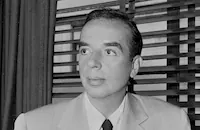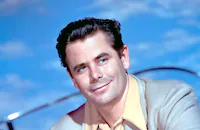The Four Horsemen of the Apocalypse

Brief Synopsis
Cast & Crew
Vincente Minnelli
Glenn Ford
Ingrid Thulin
Charles Boyer
Lee J. Cobb
Paul Henreid
Film Details
Technical Specs

Synopsis
Madariaga, an 80-year-old patriarch, has built a fabulous empire on the Argentine pampas, a haven from the turmoil and tension of the 1930's. As the decade ends, however, he sees with horror that his German-fathered grandson, Heinrich, has returned from Berlin filled with fanatical Nazi ideas. The situation precipitates a violent family quarrel in which Madariaga predicts that the Four Horsemen of the Apocalypse (Conquest, War, Pestilence, and Death) will soon devastate the earth. The emotional strain proves too much for the old man, and he dies in the arms of his favorite grandson, Julio, a reckless playboy. In 1939 Julio goes to Paris with his French father, Marcelo, and is immediately drawn into the social circle of Etienne Laurier, an idealist who opposes the Nazis. Julio falls in love with Laurier's wife, Marguerite, and then becomes her lover when Laurier is sent to a concentration camp. Gradually Julio becomes involved with the French Resistance, in which his sister, Chi-Chi, is already active. Laurier is released from prison a sick and broken man, and Marguerite leaves Julio to return to her husband. Julio then becomes more and more involved in the daring raids of the French partisans against the occupying forces. Because of his family connection with two top Nazis, his Uncle Karl and cousin Heinrich, Julio is considered above suspicion by German officials, but he is unable to prevent the deaths of both Laurier and Chi-Chi. Finally, Julio decides to risk his life in a daring operation: the destruction by British bombers of the Nazi headquarters in Normandy. Since it is imperative that someone guide the planes to their target, Julio gains entry to the headquarters and accomplishes that mission. As the bombs begin falling, he is confronted by Heinrich. Knowing they are doomed, the two cousins drink a final toast to the happiness their families once shared.

Director

Vincente Minnelli
Cast

Glenn Ford

Ingrid Thulin

Charles Boyer

Lee J. Cobb

Paul Henreid

Paul Lukas

Yvette Mimieux

Karlheinz Böhm
Harriet Macgibbon

Kathryn Givney
Marcel Hillaire
George Dolenz
Stephen Bekassy

Nestor Paiva
Albert Rémy
Richard Franchot
Brian Avery
Crew
Robert Ardrey
Julian Blaustein
George W. Davis
Tony Duquette
Adrienne Fazan
John Gay
A. Arnold Gillespie
Keogh Gleason
Henry Grace
Sydney Guilaroff
Charles K. Hagedon
Robert R. Hoag
René Hubert
Milton Krasner
Lee Leblanc
Ben Lewis
Urie Mccleary
Franklin Milton
Orry-kelly
Charles Parker
Walter Plunkett
André Previn
Alex Romero
Olallo Rubio Jr.
Frank Santillo
Elliot Scott
Eric Von Stroheim Jr.
William Tuttle

Film Details
Technical Specs

Articles
The Four Horsemen of the Apocalypse (1962)
For this new adaptation of the Vicente Blasco Inbanez novel, the studio insisted, over Minnelli's protests, that the temporal setting be shifted from the First World War to the Second. The film opens in the early '30s on the lands of old Julio Madariaga (Lee J. Cobb), an aging, ebullient Argentinian cattle baron happily anticipating a reunion dinner with his daughters' families. One has married a Frenchman, Marcelo Desnoyers (Charles Boyer); their eldest, Julio (Glenn Ford), has inherited his grandfather's taste for life and love, and none of his industriousness. Madariaga's other daughter has taken a German husband, Karl Von Hartrott (Paul Lukas). When pressed by his grandfather about his post-college plans, Karl's son Heinrich (Karl Boehm) admits that he has taken a position within the Nazi party. In the course of his fatally apoplectic response, Madariaga despairs of a world once again set upon by the biblical harbingers of Conquest, War, Pestilence and Death--who, conveniently enough, were worked into the design motif of his fireplace andirons.
The story leaps ahead several years to Paris, where Julio is spending his life in comfortable indolence. He begins to focus an improper amount of attention on Marguerite Laurier (Ingrid Thulin), the beautiful blonde wife of idealistic newspaper publisher Etienne Laurier (Paul Henreid). As the months pass and she finds herself responding in kind, Etienne is called into service to face the encroaching German forces. Julio would rather stay than abandon Marguerite as the storm troopers come marching down the rue; he's able to gain a few favors by virtue of Uncle Karl's being named the de facto mayor. Once Julio's vivacious younger sister (Yvette Mimieux) is tortured to death for her Resistance ties, Julio finally elects to take a stand and act as a mole for the Underground. His most dangerous mission, to act as a beacon for the Allies to target a German intelligence stronghold, brings him into a final confrontation with Heinrich.
Unfortunately, the casting of the leads proved to be problematic. Minnelli's lobbying to sign Alain Delon to play the role of Julio went unheeded by the producers, who were set on having an American--and MGM contractee--in the lead. Without knocking Glenn Ford's considerable career accomplishments, he should have been no one's first choice, at age 46, to assay the part of a dissolute young Latin American playboy; his characteristic integrity doesn't serve the role until the third act, when Julio finds his redemption with the resistance. Thulin was recruited on the strength of her sensitive efforts for Ingmar Bergman like Wild Strawberries (1957). However, the studio deemed her accent so impenetrable that Angela Lansbury was brought in to dub over her lines; the Swedish star, demeaned by the experience, would never return to Hollywood.
"There I was, stuck with a story I didn't want to do, with a leading actor who lacked the brashness and impulsiveness I associated with the part," Minnelli recalled in his autobiography. "I wanted new challenges, but I didn't think they'd be that challenging." Still, the director rose to the occasion with his expected meticulousness and visual flair. "I would again use red as a dominating color, culminating in a red gel over the newsreels, which would be shown in a documentary way to point up the devastation of the war and the insensitivity of the principal actors in taking scant notice of it."
In his own memoirs, Henreid reflected on Minnelli's approach to the sequence when Thulin accompanies him to the train station upon his departure for the front. "Each extra was rehearsed for a full day, and everyone has his own little story worked out," the actor recalled. "But when the scene was finally shot, the camera panned and dollied to Ingrid and me walking to my compartment, and the dialogue was played on the walk and in front of my coach, all done relatively close. All the little scenarios around us were lost; the rehearsed, beautiful bits never noticed, and what little was seen didn't register because the focus was on Ingrid and me! But that was how Minnelli worked. He never took chances."
Producer: Julian Blaustein
Director: Vincente Minnelli
Screenplay: Robert Ardrey, John Gay, Vicente Blasco Ibanez (novel)
Cinematography: Milton Krasner
Film Editing: Adrienne Fazan, Ben Lewis
Art Direction: George W. Davis, Urie McCleary, Elliot Scott
Music: Andre Previn
Cast: Glenn Ford (Julio Desnoyers), Ingrid Thulin (Marguerite Laurier), Charles Boyer (Marcelo Desnoyers), Lee J. Cobb (Julio Madariaga), Paul Henreid (Etienne Laurier), Paul Lukas (Karl Von Hartrott), Yvette Mimieux (Chi-Chi Desnoyers).
C-154m. Letterboxed. Closed captioning.
by Jay S. Steinberg

The Four Horsemen of the Apocalypse (1962)
Quotes
Trivia
Notes
Location scenes were filmed in France. The film acknowledges the cooperation of Moctezuma Films. Another adaption of the Vicente Blasco-Ibáñez novel was produced by Metro Pictures in 1921. That version was directed by Rex Ingram and starred Rudolph Valentino and Alice Terry (see AFI Catalog of Feature Films, 1921-30).

Miscellaneous Notes
Released in United States Winter February 7, 1962
Remake of the 1921 Metro release of the same title.
Selected in 1995 for inclusion in the Library of Congress' National Film Registry.
CinemaScope
reels 11
Released in United States Winter February 7, 1962














